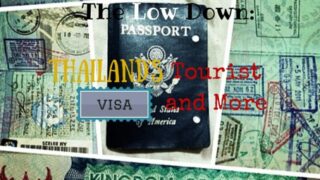Work & Live in Thailand: How To Do It? Cost of Living? And More!
I remember it like yesterday. Between my days of working from 8 am to 1 am, slowly selling off everything I owned, and drinking lots of coffee, I was plotting my escape to Thailand to teach English and travel for a year.
I had no idea of what was to come of my life. I just wanted to “get out” and do something different. I’ve always wanted to travel, so before I continued my “life” at a soul-sucking 9-5 (plus side jobs), I wanted to just… go!
So after two years of working three jobs, secretly sobbing at my desk because I was miserable, and saving my pennies, I just up and left the USA for Thailand.
I chose Thailand simply because:
- They needed English teachers.
- They had beaches and a warm climate (I’m from Florida, I didn’t understand cold weather)
- It seemed like a safe place, with nice people and interesting culture.
It wasn’t much deeper than that; I had no idea what to expect! Never in a million years would I have thought that Thailand would make such a huge impact on my life and be the catalyst and driving force that helped shape my world and life. At the time, I was paralyzed with fear, because seriously, who picks up and moves to Thailand alone? Apparently me…
But I had something pushing me to try traveling and staying abroad for longer.
Thailand welcomed me with open arms on May 5th, 2011, and I’m forever grateful to the country that “started it all” for me! I loved living in Thailand; I couldn’t have chosen a better starting place to start working abroad and to grow and learn about making travel a lifestyle for me.
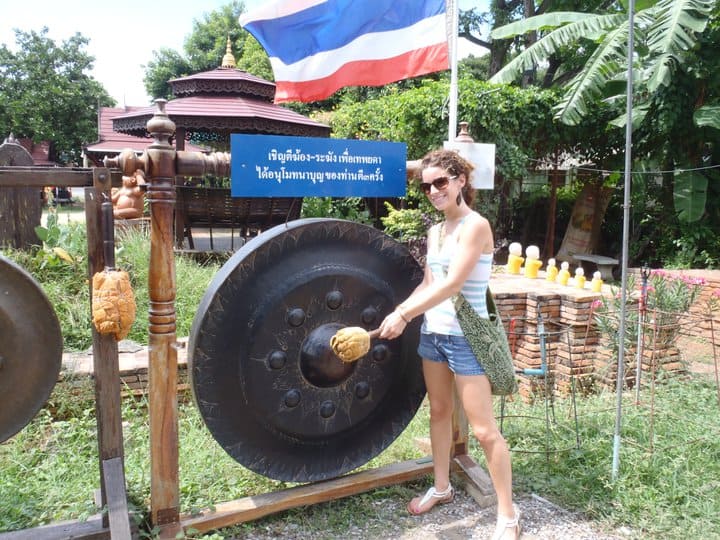
I ended up living in Thailand on and off for about four years! I went back a few years later to live for a few more months, and I have no doubt I will continue to “live in Thailand” through my travels!
I’m sure you have lots of questions, so here’s what it’s like living in Thailand, the costs, the lifestyle, and how the heck you can “live” in another country that’s not your own!
Table of Contents
How To Work & Live in Thailand
Thailand is not just a popular place for tourists; more and more digital nomads are heading to this South Asian gem and calling it their home. With low living costs, plenty of sun, and a relaxed way of life, who wouldn’t want that?
So why work and live in Thailand? I have seven great reasons for you right here…
1. The Landscapes Suit Everyone
Thailand really is a country of contrasts, meaning there is something for everyone. The landscape is vibrant and diverse, from stunning white sand beaches to bustling cities, green mountainous landscapes, to lush rainforests.
The capital city of Bangkok is about as much of a contrast to the stunning Phi Phi Islands as you can get, and both are worth visiting and exploring in their own right. It has restaurants and shops, urban temples, mega-malls, and floating markets.
If you still want city living, but Bangkok is a little much for you, then you have the northern city of Chiang Mai to enjoy, surrounded by mountain landscapes and with more of a laid-back atmosphere.

Attend Thai festivals like Loi Krathong while living in Thailand 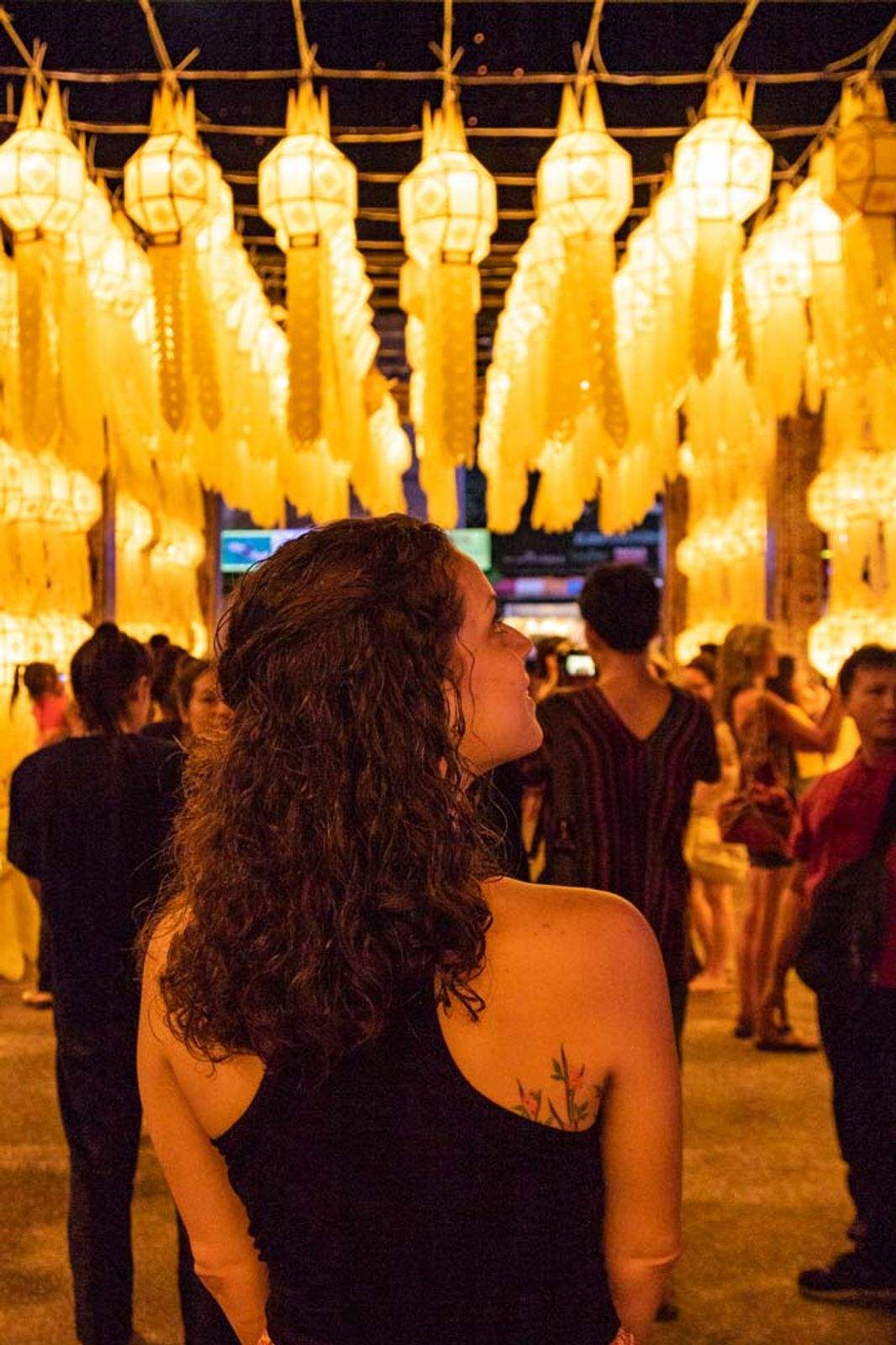
Loi Krathong Festival in Thailand
Then you have the coastal towns with their many islands, about as close to paradise as you can get, with stunning white sands, monkeys on the beach, and drinks in coconuts. There is something for everyone when it comes to living in Thailand.
In fact, I was so spoiled. I often bounced between Chaing Mai and Pai so I could get my dose of city life and the mountains, and then I’d pop down to Krabi a bit to get my toes in the sand and to swim with the fish. Living in Thailand checked all those boxes for me.
RELATED: Krabi Itinerary: Things To Do in Krabi, Thailand for 1-7 Days & When To Visit.
2. The Weather
The weather can be a big deal when you are looking for a place to live and base yourself, and Thailand’s weather is pretty remarkable throughout the year.
There are seasons, but they are quite unlike the “regular” seasons. In general, you should expect sunny, warm weather most of the time, making living in Thailand pretty desirable for most.

The rainy season falls between June and October, but even then, it is warm and sunny most of the time, with almost daily heavy rain showers that end just as abruptly as they start. If you are on the hunt for somewhere with year-round sun and warmth, Thailand is a pretty good bet.
3. An Easy Place To Work
Thailand may not strike you as a place with super speedy internet, but many people are pleasantly surprised. Sure, it is not as high-tech as Hong Kong, but it should not give you any major problems and is even good on many of the islands.
For example, on Koh Phangan and Koh Lanta, the internet is pretty great especially for being on an island! There are also plenty of co-working spaces sprinkled throughout the country, especially in the towns and cities, providing a comfortable, easy place to work and an easy place to meet like-minded individuals living in Thailand.
Even without a co-working spot, a lot of accommodation has pretty decent internet. Your best bet is finding apartments, entire homes, or small guesthouses or hotels so you’re not sharing the internet with too many others if any at all! That’s what I always did and I was usually lucky.
4. Other Digital Nomads and Travelers
Relocating somewhere is always easier when others are in the same boat as you. In recent years especially, Thailand has become a hot spot for digital nomads thanks to its affordability and laid-back way of life; therefore, it won’t be hard to find people living a similar lifestyle to you.
There are plenty of communities and Facebook groups that will help you meet other digital nomads living in Thailand. Alternatively, hostels and coworking spaces are a great way to make some more friends.

It’s also an easy place to make friends if you’re traveling solo. Don’t worry in Thailand! There are tons of others doing it, and meeting them couldn’t be easier.
I was solo the entire time I was living in Thailand and traveling the area… But I rarely was actually solo! That’s another perk of staying somewhere for a longer period of time too, you have time to connect more with others.
RELATED: How To Work Abroad & Travel the World.
5. Affordability & Ease
One of the biggest draws to Thailand for both tourists and digital nomads alike is its affordability. If you are coming from the US, you will immediately notice the price difference.
A whole month living in Thailand, including food, accommodation, and all other expenses, is only likely to cost you the equivalent of a month’s rent back home, so it is a great place if you want to save.
Although the whole country is affordable, some places are even more affordable than others, with Chaing Mai being one of the cheapest, with well-located studio apartments around $300-500 a month and tasty meals as low as $2.
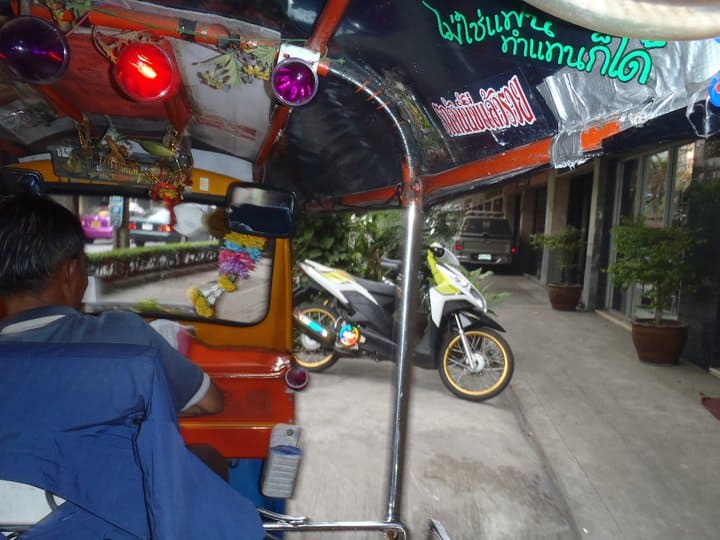
Everything is just pretty easy, making it the perfect destination to arrive in with very little in the way of plans. I literally landed on my first day in Thailand, as a total noob, without a hotel reservation and just walked into a place and got a room for a few dollars.
I mean, in hindsight, I have NO idea why I didn’t make a reservation to make my life a bit easier, but the point is, it wasn’t an issue.
6. Friendly Locals
The locals will likely be some of the most friendly people you will meet on your travels. They usually welcome digital nomads and will often go out of their way to help you.
Their work-life balance is perfect, as they understand the importance of putting work to the side when the time is right and simply spending time with friends and family and doing what they enjoy. When locals stop you in the street for a smile and a chat, you will soon see why so many people love calling Thailand their home.
7. People Will Speak English
Compared to the surrounding countries, the people of Thailand usually speak enough English, helping to alleviate that language barrier that can make living abroad difficult.
With that being said, take this one with a grain of salt. There will still be plenty of places where hardly anyone speaks English! But–In most places you visit in the country, where other tourists visit, you will be able to communicate in a Thai-English hybrid.

Chances are their English will be better than your Thai, and they will usually be happy to swap over to English if they need to. I’ve often used charades and pointing and smiling as a way to communicate and have gotten by just fine too if you’re far off the beaten path. They will try to help if they know English or not!
Average Cost of Living in Thailand?
Broadly speaking, the cost of living in Thailand is low, consistently making the top 10 lists for affordable destinations. Here is a breakdown of what you can roughly expect to pay for everyday things.
- Apartments – $200 a month
- Larger, newer apartment with pool – $400-600 a month
- Large, comfortable apartment in Bangkok – $800+ a month
- Larger house/accommodation with 2+ bedrooms – $1000 a month
- Electricity and internet – $75-150 a month
- Scooter rental – $75-120 a month depending on your location
- A tank of petrol for scooter – $3
- Co-working space – $100 a month
- Gym membership – $25 a month
- Massage – $9 an hour
- Monthly BTS Transport Card for Bangkok – $11.50-$30 a month
- An overnight train or bus – $15 average
- Street food meal – $1-3
- Western meal – $5+
- A loaf of bread – $1
- Milk – $1.40
- Local beer in a bar – $1.70
- Imported beer in a bar – $2.85
- Thai meal in a restaurant – $3+
- Fruit shake – $.60-1.50
- Veggies at the market – $3-4 for a selection
- Coffee – $1.25
RELATED: How Much Does It Cost To Live in Thailand and Other FAQ.
What Kind of Place Can You Get Living in Thailand?
When it comes to finding a place to live in Thailand, you really will be spoilt for choice. There are so many different types of accommodation to suit all needs and budgets. Whether you want to live the basic life in a jungle hut or live a life of luxury in a penthouse, the options are there, and none of them will break the bank.
The country is kitted out for all sorts of budgets, so you’ll soon find the right level that suits both your money and your living style. Most people will settle for something that is more middle of the range when living in Thailand, such as a condo or a 1 or 2-bed apartment that is well located.
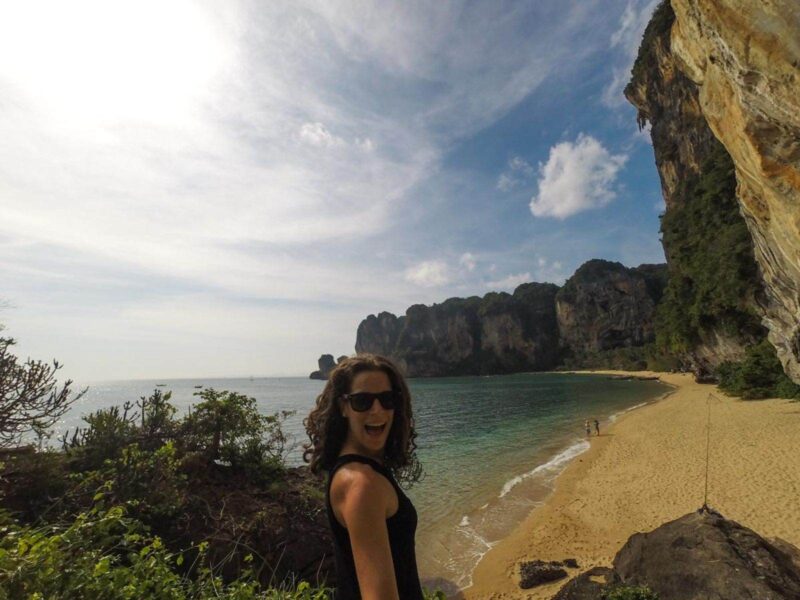
If you have a smaller budget, studio apartments outside of the city centers tend to be more affordable, or backpacker hostels are an even cheaper option still.
Bangkok tends to be the most expensive place for accommodation, while the north of the country is cheaper. The cost of accommodation on each of the islands varies greatly.
- For $70-120 per month, you can expect to get a very small studio apartment that will be similar in size to a hotel room and will have an attached bathroom and maybe a balcony. You may or may not have your own kitchen.
- For $140-280 per month, you will be able to get a nicer 1 bedroom apartment, some of which will come with a small kitchen area. The buildings in which these apartments are found will also often have a pool and a gym.
- For $310-600 a month, you are getting a bit more of a luxury living experience. You could get a 1 or 2 bedroom apartment which is fully furnished with a full kitchen. The apartment would be in a great location, and the building may have a pool and a gym. If you are in the north, you will likely be able to rent a whole house in this price range.
- For $600-1000 per month, you can expect some pretty fancy accommodation. In Bangkok, apartments in this price bracket will be really nice with good amenities and perks. But for example, in Chiang Mai, you could get a large 3-4 bed furnished house in the price range.
What you get for your money will again, vary across the country. But this is a good average for what you’d get. In short, you can live in a decent place for a few hundred bucks!
How To Find a Place To Live in Thailand
There are many ways you can go about looking for a place to live when you arrive in Thailand. One of the most convenient methods is going through an agency, but that doesn’t necessarily mean it is the best. The agency will do most of the hard work for you, but this service will, of course, come at a higher price tag.
The most cost-effective method is to cut out the middle man and look for your accommodation yourself. There are plenty of available apartments around, and the best way to get a feel if they are right for you is to actually see them.
You could always book a room in a hotel or hostel for a few days when you arrive, and use this time to walk the streets, hunting out the accommodation that you like the look of.
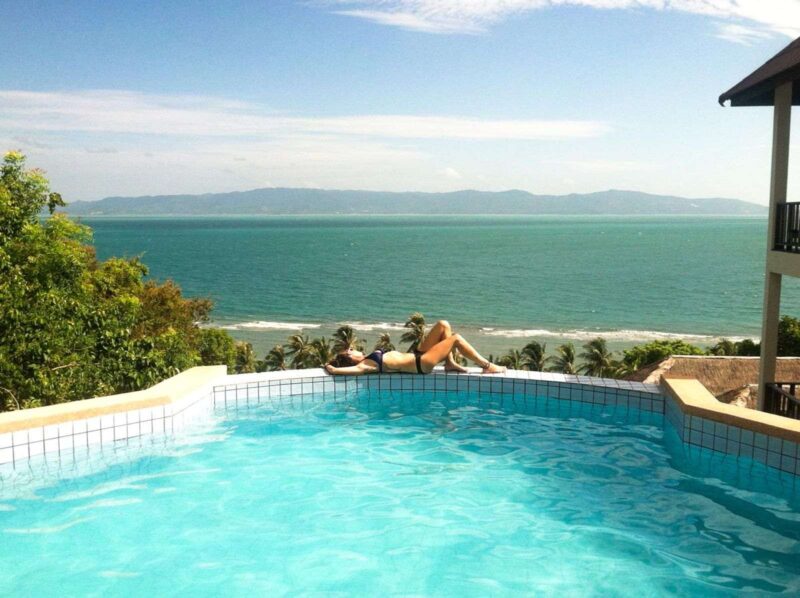
In towns like Chiang Mai, if there is a particular area of town you like the look of, you can walk through it and keep your eyes out for any signs that say that there are rooms or units available. It’s then usually just a case of talking to the staff inside the building and seeing if they can show you around.
If you don’t fancy walking the streets, other options include joining a Thailand digital nomads Facebook group, where you should be able to find plenty of apartment recommendations when it comes to living in Thailand.
There are lots of Facebook groups where you will find long-term apartment vacancies, and it is also a good place to start if you are looking to share a place with another digital nomad to reduce the cost. You could also give apps like Airbnb a go, as they often provide discounts for those looking for a long-term rental and you can always extend in person.
How Can You Work in Thailand?
Yes! You can WORK in Thailand legally. These are the most common ways to work and live in Thailand, and what’s up with the visa situation.
Teaching English in Thailand
Teaching English is one of the most common jobs for those living in Thailand. For Thais, learning English is considered necessary, so there is always a need for more English teachers.
Language schools, primary schools, universities, and other English classes are all good places to start looking for employment. To be an English teacher, you’ll need some basic qualifications, including:
- Preferably a Bachelors Degree
- A TEFL Certification
- You should be a native English speaker
- You should have a passion for helping others learn English

How much you will earn from teaching English in Thailand will vary greatly depending on the city you are teaching in and the level you are teaching; for example, teaching university-level English will pay more.
In bigger tourist destinations, such as the south of the country, you should expect to earn less than what you would earn in less desirable locations. I was paid $1000/month in Ayuttaya teaching at a public high school.
You’ll likely want to fly over on a tourist visa (free upon landing in most cases). Once hired by a school, they will assist you in getting a proper work permit. This is what happened to me and everyone else I met.
RELATED: How To Teach English Abroad in Thailand – Live and Work in Thailand!
Being a Digital Nomad in Thailand
Due to the large volume of digital nomads, it is not surprising to see many coworking spaces popping up all over the country. These offer high internet speeds and will be filled with like-minded people working and living in Thailand.
As a digital nomad, the type of work you can do is endless. If you are in the tech niche, then a programmer, website developer, or app developer are all good options, as all can be done remotely. In the marketing niche, jobs include SEO specialist, social media marketer, or affiliate marketer.

Other jobs include freelance writing, being a customer support representative, graphic designer, teaching a foreign language online, blogging, or virtual assistant. There is a lot out there to suit a huge range of skills that require time and a good internet connection.
I had absolutely NO idea what I was doing with finding work online. I didn’t have the skills or qualifications! But it doesn’t mean I couldn’t teach myself. I was teaching English in Thailand and people were willing to pay me to write about my story and how I moved there, how I was teaching there etc.
WHAT!? Long story short, that’s how I started working online and blogging, and it slowly rolled into getting paid to write content for an English learning app, doing virtual assistant work, data entry, teaching English online, and random other online gigs. Remember, I had ZERO experience.
I have lots of resources regarding working online, freelancing, etc.:
- 20 Online Jobs With No Experience Needed (So You Can Travel More)
- 56 Work From Home Websites – Earn Money Outside the Office!
- Becoming a Digital Nomad: Realities & Resources
- 23 Digital Nomad Jobs: Take Your Desk Around the World
- 71+ Ways to Travel & Make Money – A Badass List of Paid Work Abroad
- How to Start Freelancing for Beginners – Work Online & Travel!
- How to Teach English Online From Home + 29 Schools To Apply To
- 17 Free Online Tools to Make Your Work Life Easier
Just remember, being a digital nomad living in Thailand means you’re only physically in the country; you are not working for a company IN Thailand. You are working online, and your work is based essentially anywhere else in the world. You are just choosing to base yourself in Thailand.
Top Places To Live in Thailand as a Digital Nomad
So where to live in Thailand? You can choose anywhere but here are some of the most popular spots for people to base themselves and some of the best spots for internet too (very important!)
Bangkok
Bangkok can be busy and scary, but it is bursting with fun, and there is always something going on. It is one of the nomad hubs of the nation thanks to a large number of city condos available, as well as great food and modern lifestyle.

You’ll find super-fast internet, and unlimited cafes, however, one of the biggest downsides is that it is one of the most expensive places in the country.
Chiang Mai
Chiang Mai is arguably the number one city in the country for digital nomads to base themselves. It is where the movement of working online seems to have begun. The city itself is beautiful, and there are plenty of things to do and see in the surrounding area.
There is an endless supply of affordable places to rent and hidden gems when it comes to finding places to eat and drink. Although busy, it doesn’t compare to Bangkok’s packed streets, yet it is still effortless to meet other digital nomads here. I lived here on and off during my time in Thailand.
RELATED: 7 Unusual Things To Do in Chiang Mai.
Koh Lanta
Over recent years, Koh Lanta has grown in popularity as a base for digital nomads. Picture chilled beach towns filled with a string of popular bars and eateries.
Expect to find accommodation in the form of bungalow stays rather than high-rise apartments, so there is a bit of a lack of modern accommodation but I’d choose my cute beachside bungalow here over a highrise any day anyway! There’s also a co-working hub here.
Krabi
I was in love with the karst mountains and the azure waters as a professional beach bum so while Krabi may not be the most popular place for digital nomads, I found myself here often.

I lived in Krabi Town so I had Tonsai, Railay, and Ao Nang in my backyard, AKA one of the prettiest places I’ve been in the world according to me!
Koh Phangan
The laidback lifestyle of Koh Phangan can be very popular for many digital nomads, which is hardly surprising when you look at its pristine shores.
The island is a thriving hub of yoga and meditation centers, some great vegan eateries, and gatherings on the beach. Wifi tends to be pretty good in most places, and bungalows are the style of accommodation.
Pai
Pai is located in one of the most northern parts of Thailand, surrounded by lush green hills and one of the country’s twistest roads. Picture tie-dye and health food cafes in the town and waterfalls and hot springs in the surrounding area.
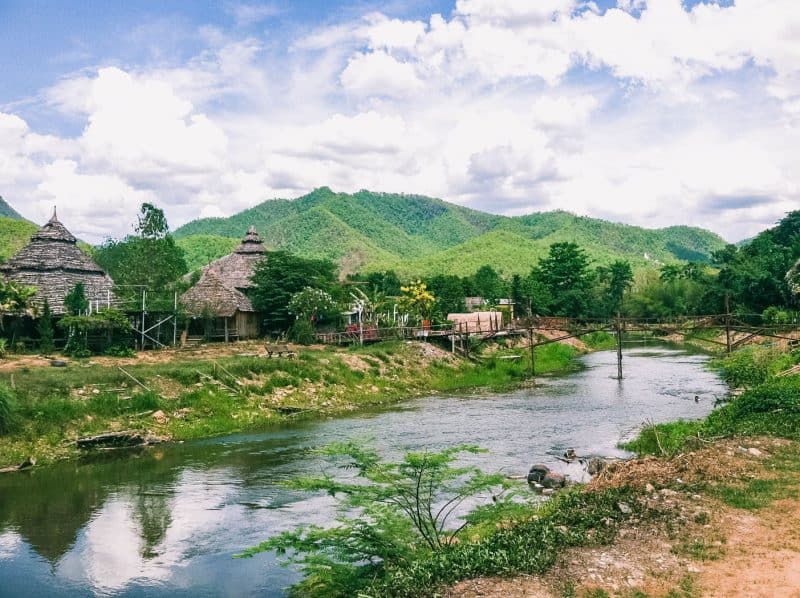
It also tends to be a bit cooler here, so you won’t be as sweaty while you work. this was my little happy hippy mountain town to stay at. While my internet back then wasn’t the greatest, I was willing to power through it for the lifestyle here. In the years, the infrastructure has improved though.
Koh Samui
If sun, sea, and sand are what draws you to living in Thailand, Koh Samui is a good place to base yourself. Be aware that it can be a bit of a party island and is also a hot spot for tourists, but there are still some corners you can make your own, giving you the best of both worlds.
You’ll be able to choose to live in the big resort towns, small fishing villages, or somewhere in between.
So What About Visas For Living in Thailand?
For this type of lifestyle, we are using the word “living” loosely. We can only “live” in places legally for so long. Each country has there own rules for this, and for Thailand, Americans (and many other nationalities) have these visa options:
- Free 30 days upon landing, you have the ability to extend for a further 30 days from within the country,
- Get a 60 days visa at an embassy outside of Thailand and extending from within the country for a further 30 days.

There are numerous other ways to live in Thailand and extend, even other visas like the self-defense visa. Of course, if you teach English, you’ll get a work permit that lasts for a year. If you’re a digital nomad, don’t want to teach or practice self-defense, you can stay a few months with their tourist visa options mentioned above.
Do some digging to see what visa for living in Thailand is best for you.
RELATED: The Longest Tourist Visas for U.S.A. Citizens, How To Extend Visas and More
So Why Is Thailand The Best Choice for Living and Traveling?
You just can’t beat it! Thailand gave me a welcoming experience to dipping my toes in the “work and live abroad pool” and it’s how I am where I am today. No doubt!
I started my blog there, tons of my travel-jobs were done there, with Thailand being my base and my playground during my off times. It was affordable and easy for me, and it gave me the time to teach myself how to be a digital nomad.
Of course, Thailand itself is a top country to visit, whether it’s for a quick visit, to “live” in, or to extend your travels. The scenery is stunning, the culture is fascinating, it’s easy to travel, the food is the BEST, the lifestyle is laidback, the people are warm… I could go on forever, but I think you get the point.
I freakin’ love Thailand and I bet you will too!

I can’t really answer the question “what’s your favorite country?” because it’s not a fair question—what’s the “best” anyway? But I can always give a top three or top five, and I know Thailand will always be on that list. No matter what.
Here are all my favorites places to explore in Thailand, itineraries, and more:
- 27+ Things to Do in Pai, Thailand + Where To Eat and Sleep
- Krabi Itinerary: Things To Do in Krabi, Thailand For 1-7 Days & When To Visit
- Backpacking Thailand: The Only Guide You Need to Prep Your Trip
- An Adventurous Thailand Itinerary: 2 Weeks – 2 Months
- 3-Day Bangkok Itinerary For First-Timers
- Chiang Rai Itinerary: 10 Things To Do in Chiang Rai That You Can’t Miss
I can’t wait to head back (hopefully in the near future), to live in Thailand again. Would you live in Thailand?
This post is written in partnership with the Tourism Authority in Thailand (TAT) but as always, everything here is my honest opinion!
>>> EVEN MORE AROUND THAILAND<<<
“One Night in Bangkok … and the World’s your Oyster”
Backpacking Thailand: The Only Guide You Need To Prep For Your Trip
27 Things to Do in Pai, Thailand + Where to Eat and Sleep
Where to Stay in Pai, Thailand: Pai’s Hostels, Hotels and Resorts
21 Krabi Beaches That’ll Make You Book Your Trip Today (Thailand)
9 Krabi Island Hopping Tours That Will Make Your Jaw Drop (Thailand)
Photo and Video Blog- Ao Luk, Krabi, Thailand
Krabi Itinerary: What To Do In Krabi, Thailand for 1-7 Days & When To Visit
First Timers: Rock Climbing Krabi, Tonsai and Railay, Thailand
Where To Stay In Krabi, Thailand For Any Budget
Where to Eat in Krabi Town: Night Markets and Restaurants
Krabi’s Beauties: Railay Beach and Tonsai Beach, Thailand
A Thailand Visa Run Gone Wrong
Thailand’s New Year, Songkran, Is the World’s Largest Water Fight
7 Unusual Things To Do in Chiang Mai
Photo Blog: Doi Inthanon, a Day Trip from Chiang Mai
Chiang Mai to Pai and Back! The Best Ways to Get Around (Thailand)
4 Lesser-Known Spots Around Mae Hong Son To Go To
Chiang Khong to Huay Xai Border Crossing (Thailand to Laos)
Chiang Rai Itinerary: 10 Things To Do In Chiang Rai That You Can’t Miss
Thai Vegetarian Food That You’ll Want in Your Mouth
7 Reasons Why Eating Thai Street Food Is The BEST & How To Avoid Getting Sick
Play it Cool: Thailand’s Do’s and Don’ts
Photo Blog: Kanchanaburi – Bridge on the River Kwai and Erawan Falls


